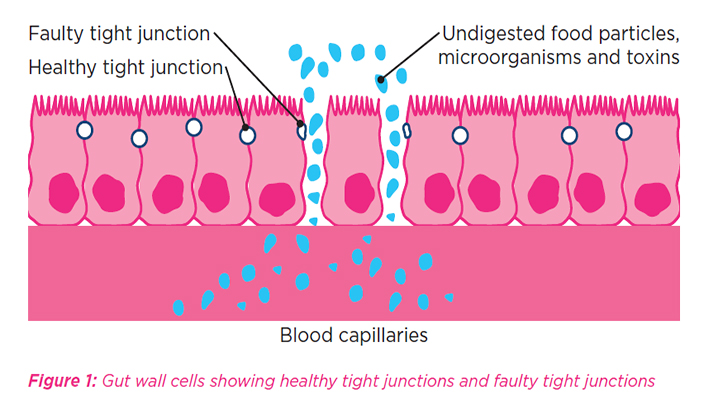Gut health is a crucial factor affecting the health and performance of dairy cows, and is therefore key to farm productivity and profitability, producers are being advised.
“During stress periods, the dairy cow’s gut wall becomes more permeable, or ‘leaky’. When this occurs, undesirable bacteria and toxic substances can pass into the blood stream, initiating an inflammatory response,” explained Anna Millar, Trident MicroNutri’s ruminant technical manager.

Milk yield and reproduction are very easily influenced by stress, due to the high energy and protein demands of lactation, and the complexity of the reproductive processes and organs involved.
“Inflammatory responses require energy. As this energy will be taken from the available measure the cow would use for production, we can see negative impacts on productivity, fertility and overall health,” she added.
Acidosis and Endotoxins
When there is an imbalance of rapidly fermentable carbohydrates in the diet, causing a decrease in ruminal pH to a level below 5.6, cows will also be at high risk of acidosis.
“When the rumen environment becomes more acidic, the balance of digestive microbes changes, with increased starch digesters and less fibre digesters. Continually increased starch digestion further decreases pH,” continued Ms Millar.
“This results in a significant imbalance in nutrient utilisation and has also been associated with reduced milk yield and butterfat, alongside health issues. The financial impact is substantial due to decreased production, and costs of treatment.”
The reduction in ruminal pH stimulates the gram-negative bacteria present in rumen fluid to die, and release endotoxins or lipopolysaccharide (LPS). These gram-negative bacteria can also be present further along the digestive tract.
“It has been well proven that subacute ruminal acidosis (SARA) and stress have been associated with increased permeability of the gut wall, and increased inflammation markers in the blood, likely due to the transfer of LPS from the gut,” Ms Millar explains.
“Circulating LPS and increased permeability of the gut wall results in an activated immune system, which reprioritises the channel of energy to immunity and away from production, growth, and fertility.”
Two-step approach
To reduce the risk of leaky gut and minimise the release of endotoxins in the digestive tract, Trident MicroNutri advises a two-step approach to support animals during stress periods.
“Firstly, we can support the stability of the rumen pH with AcidBuf, the unique marine sourced buffer, with highly available mineral sources,” said Ms Millar.
“By stabilising rumen pH, the risk of acidosis and leaky gut is reduced, and proliferation and lysis of gram-negative bacteria are minimised, hence reducing endotoxin load.”
Secondly, Ms Millar suggests binding the LPS in the rumen with Ultrasorb R.
“The recent reformulation of Ultrasorb R has considered both existing and newly available raw materials for both binding and detoxification,” she said.
The upgrade of the yeast extract and the addition of a new live yeast has improved fusarium mycotoxin binding, while the addition of new clays has increased the endotoxin binding capacity from 40% in the old formulation to 70% in the new Ultrasorb R.
“By providing endotoxin binding and detoxification, we support the cow through reducing the endotoxin load and likelihood and severity of an immune response,” concluded Ms Millar.


